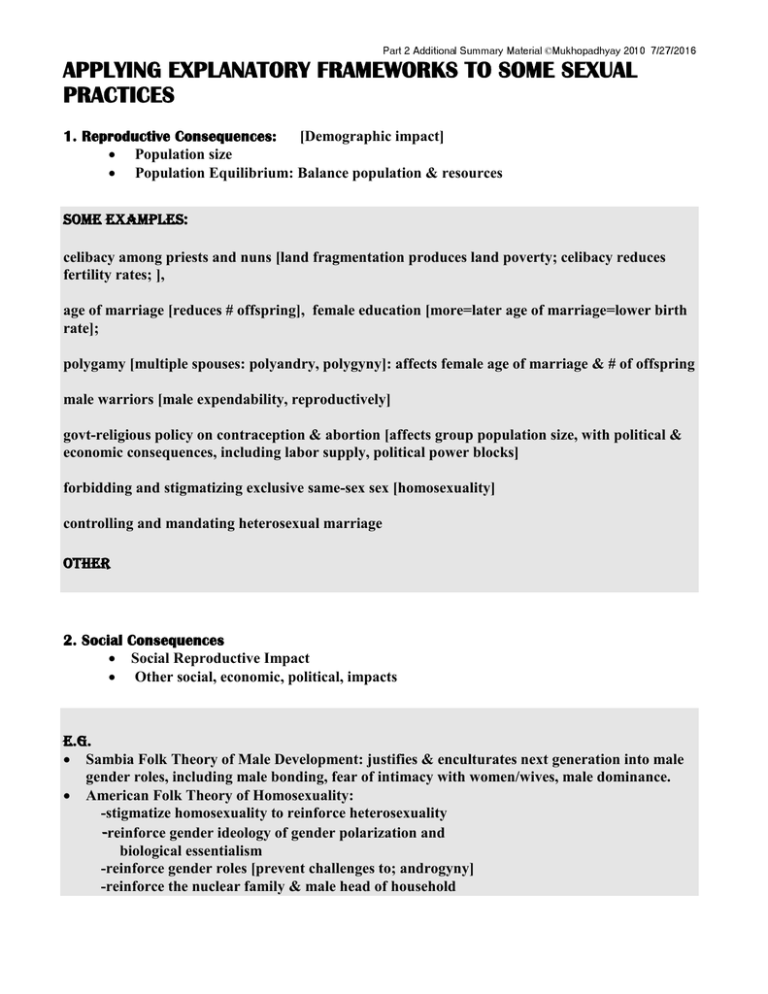
©
APPLYING EXPLANATORY FRAMEWORKS TO SOME SEXUAL
PRACTICES
1. Reproductive Consequences:
[Demographic impact]
Population size
Population Equilibrium: Balance population & resources
Some Examples:
celibacy among priests and nuns [land fragmentation produces land poverty; celibacy reduces
fertility rates; ],
age of marriage [reduces # offspring], female education [more=later age of marriage=lower birth
rate];
polygamy [multiple spouses: polyandry, polygyny]: affects female age of marriage & # of offspring
male warriors [male expendability, reproductively]
govt-religious policy on contraception & abortion [affects group population size, with political &
economic consequences, including labor supply, political power blocks]
forbidding and stigmatizing exclusive same-sex sex [homosexuality]
controlling and mandating heterosexual marriage
OTHER
2. Social Consequences
Social Reproductive Impact
Other social, economic, political, impacts
e.g.
Sambia Folk Theory of Male Development: justifies & enculturates next generation into male
gender roles, including male bonding, fear of intimacy with women/wives, male dominance.
American Folk Theory of Homosexuality:
-stigmatize homosexuality to reinforce heterosexuality
-reinforce gender ideology of gender polarization and
biological essentialism
-reinforce gender roles [prevent challenges to; androgyny]
-reinforce the nuclear family & male head of household
©
Anti-miscegenation laws [outlawing mating/marriage between races in the U.S.]: preserve
markers of racial hierarchy; preserve race-based system of social stratification & inequality
Loving Vs. Virginia, 1967, ruled such laws unconstitutional.
Parental/Family control over marriage & mating [reproduces social system, including race,
religious, ethnic, class hierarchy]
Virginity: promotes marriage [with culturally defined linked roles, including providerdomestic/child care role]
Women’ Control over their own Reproductive Decisions: [sexual autonomy; marriage optional
for sex or children;
Population Growth vs. ZPG [zero population growth]
Political consequences of higher birth rates in a democracy
Ecological consequences of higher birth rates, especially in higher consuming countries
OTHER???
©
SUMMARY POINTS for Part II of the Course
Social Control of Sexuality:
Mating and Reproduction, for humans, becomes a societal not just an
“individual” concern.
Marriage, mating, reproduction become “too important” to leave to
individuals. They have profound consequences for society, for
reproduction and social reproduction.
Society [and those with the most power within a society] control mating and
reproductive processes and practices through various means, including
new cultural inventions.
o Culture invents new social-behavioral products, institutions like
“marriage”, “family”, “kinship”, and roles like “husband”, “wife”,
“cousin”, “uncle”.
o Groups with power [ “elders”, political elites, high status groups,
including religious institutions] control .
o New mental products emerge: ethnotheories and other beliefs,
categories, labels, attitudes and values which explain, reinforce, and
“legitimize” [justify, make legitimate and mandatory] sexually-related
social-behavioral products.
Sexual Beliefs and Practices do not exist or arise in a “vacuum”, by chance.
They are embedded in a larger cultural system. This system includes:
o beliefs [ethnotheories, cultural models], social & physical
environmental conditions, cultural institutions, especially
religious institutions; and, importantly, power relations
[including those based on gender, class, ethnicity/race/caste,
religion, other communities, other status differences
©
Individuals Engage in Sexual Activity for a Multiplicity of Reasons
e.g. erotic focus, erotic sensation, reproduction, friendship, connection,
obligation, intimacy, money, fear, to please others, “love”, powerdomination, anger, political motivations, etc.
Sexuality is a complex subject: any simple explanations of cultural practices,
political issues [e.g. abortion, pre-marital sex, family “values”], or individual and
group “choices” [sexual preference, marriage partners] are usually simplistic [that
is, enormously over-simplified]
e.g. SSS: Choice or Biological; Abortion: pro-choice vs. pro-“life”,




